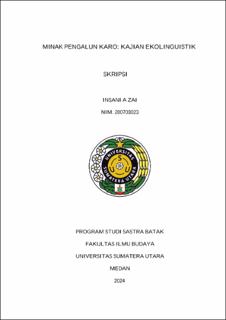Minak Pengalun Karo: Kajian Ekolinguistik
Minak Pengalun Karo: An Ecolinguistic Study

Date
2024Author
Zai, Insani A
Advisor(s)
Sinaga, Warisman
Sinulingga, Jekmen
Metadata
Show full item recordAbstract
This thesis entitled "Minak Pengalun Karo: An Ecolinguistic Study", reviews the oil that has been used for generations in traditional medicine by the Karo people. Minak Pengalun is made from natural spices and is used in the treatment of various diseases such as broken bones, wounds, and other health problems with traditional medicine methods. This study aims to explain the ecolinguistic aspects of Karo Minak Pengalun, including the description of its flora lexicon, ecology, benefits, ingredients, and usage techniques. The theoretical framework applied in this research is the ecolinguistic theory developed by Aron Meko Mbete. The research method used is descriptive qualitative method. The results revealed 31 lexicons in total, divided into 29 flora lexicons, one fauna lexicon, and one non-flora-fauna lexicon. Furthermore, this explanation is divided into 30 biotic lexicons and one abiotic lexicon. This research also explains the ecolinguistic aspects of the components used in making Minak Pengalun Karo, including the benefits of each component that are closely related to the lives of the Karo people, as well as the habitat and ecology of each of these ingredients. The theory of ecolinguistics, as described by Aron Meko Mbete, explains the interaction between ecology, language and the role of humans in the context of Karo Minak Pengalun as part of traditional medicine practices. The richness of the lexicon in Minak Pengalun is a form of interrelation between the richness of experience and physical knowledge surrounding the Karo community and its characteristics.
Collections
- Undergraduate Theses [247]
